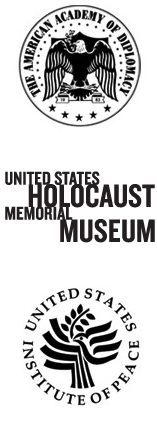Genocide Prevention Task Force
Statement of Former Secretary of State Madeleine K. Albright and Former Secretary of Defense William S. Cohen on the Presidential Initiative to Prevent and Respond to Mass Atrocities
April 23, 2012
As co-chairs of the Genocide Prevention Task Force, we enthusiastically welcome President Obama’s announcement today at the United States Holocaust Memorial Museum of his Administration’s renewed effort to strengthen our government’s will and ability to prevent, deter, and respond to threats of genocide and mass atrocities around the world. We convened our bipartisan Task Force five years ago with the regret and frustration of knowing that our government was ill-prepared to meet the challenge posed by the threat of mass atrocities.
The creation of a high-level Atrocity Prevention Board, one of the Task Force’s key recommendations, will ensure that the full range of our government’s resources are made available in new and creative ways to develop tools and approaches that will more effectively prevent and end mass atrocities against civilians. In support of this effort, we are encouraged to note new efforts to train and assist our country’s diplomats, military officers, and intelligence professionals in recognizing and reporting on where the threat of new violence looms. An informed workforce, supported with an expanded tool box of responses, and directed by leaders who have made genocide prevention a priority increases the possibility that we will finally succeed in making the promise of “never again” a reality.
About the Task Force
The Genocide Prevention Task Force was launched on November 13, 2007 and released its report to the public on December 8, 2008. It was jointly convened by the U.S. Holocaust Memorial Museum, the U.S. Institute of Peace and The American Academy of Diplomacy. It was funded by private foundations. Its goals were: (1) To spotlight genocide prevention as a national priority; and; (2) To develop practical policy recommendations to enhance the capacity of the U.S. government to respond to emerging threats of genocide and mass atrocities.
Statement of Former Secretary of State Madeleine K. Albright and Former Secretary of Defense William S. Cohen on the Announcement of the Presidential Study Directive on Mass Atrocities
August 4, 2011
As co-chairs of the Genocide Prevention Task Force, we welcome with enthusiasm President Obama’s directive to strengthen our government’s response to actual or threatened mass violations of human rights. The administration’s bold new initiative conforms closely to recommendations made by the Task Force to recognize genocide prevention as a presidential priority, emphasize early action, and stress the need to work closely with allies and friends.
We are particularly pleased to see the efforts of our bipartisan task force reflected in the presidential call for a high-level Atrocity Prevention Board to bring to bear the full range of our government’s assets and skills in the effort to deter, prevent, and halt genocide. The president’s directive represents an unprecedented commitment on America’s part to implement the internationally-agreed upon “responsibility to protect” civilian populations threatened by massive violence and to ensure that genocide prevention and response become integral components of America’s national security strategy. Today’s action is a major step forward for our country’s long-term interests and national security and contributes to international leadership on genocide prevention. This is a forward-thinking plan that if fully implemented, should eventually save countless lives.
Genocide Prevention Task Force Delivers Blueprint for U.S. Government to Prevent Genocide and Mass Atrocities
December 8, 2008 | Press Event
The Genocide Prevention Task Force today released its final report on the eve of the 60th anniversary of the Convention on the Prevention and Punishment of the Crime of Genocide. The report makes the case for why genocide and mass atrocities threaten core American values and national interests, and how the U.S. government can prevent these crimes in the future.
Jointly convened by the United States Holocaust Memorial Museum, The American Academy of Diplomacy, and the United States Institute of Peace, the Task Force began its work last November with the goal of generating concrete recommendations to enhance the U.S. government’s capacity to recognize and respond to emerging threats of genocide and mass atrocities.
“The world agrees that genocide is unacceptable and yet genocide and mass killings continue,” said Madeleine K. Albright, former Secretary of State and Co-Chair of the Genocide Prevention Task Force. “We believe that preventing genocide is possible, and that striving to do so is imperative both for our national interests and our leadership position in the world.”
Preventing Genocide: A Blueprint for U.S. Policymakers
December 2008 | Report
The report, which is entitled “Preventing Genocide: A Blueprint for U.S. Policymakers”, asserts that genocide is preventable, and that making progress toward doing so begins with leadership and political will. The report provides 34 recommendations, starting with the need for high-level attention, standing institutional mechanisms, and strong international partnerships to respond to potential genocidal situations when they arise; it lays out a comprehensive approach, recommending improved early warning mechanisms, early action to prevent crises, timely diplomatic responses to emerging crises, greater preparedness to employ military options, and action to strengthen global norms and institutions.
» View and download the report.
» View and download a brochure about the report.
Genocide Prevention Task Force
Download the Report
Task Force Members





